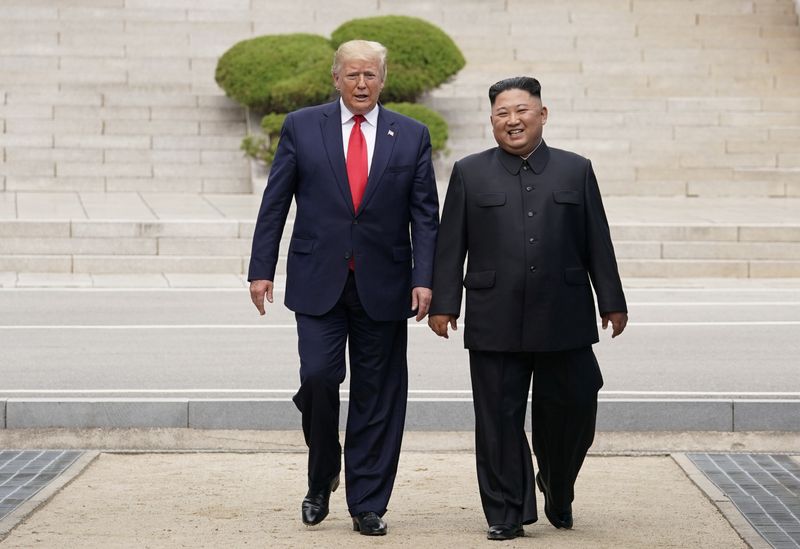By Hyonhee Shin
SEOUL (Reuters) – North Korea wants to reopen nuclear talks with the United States if Donald Trump is re-elected president and pursue a new negotiating strategy, a senior North Korean diplomat who recently defected to South Korea told Reuters.
Ri Il Gyu’s escape from Cuba made global headlines last month. He is the highest-ranking North Korean diplomat to defect to the South since 2016.
In his first interview with international media, Ri said North Korea has set Russia, the US and Japan as foreign policy priorities for this year and beyond.
While strengthening ties with Russia, Pyongyang wants to reopen nuclear negotiations if Trump – who engaged in unprecedented brinkmanship and diplomacy with North Korea during his previous term – wins re-election in November, Ri said.
Pyongyang’s diplomats are planning a strategy for that scenario, with the goal of lifting sanctions on its weapons program, removing its designation as a state sponsor of terrorism and asking for economic aid, Ri said.
The comments signaled a potential shift in the North’s stance today after recent statements ruled out dialogue with the US and warned of armed confrontation.
A summit between North Korean leader Kim Jong Un and Trump in Vietnam in 2019 collapsed due to sanctions, as Ri partly blamed Kim’s decision to trust an “inexperienced, ignorant” military commander with nuclear diplomacy.
“Kim Jong Un doesn’t know much about international relations and diplomacy, or how to make strategic decisions,” he said.
“This time, the foreign ministry will definitely gain power and responsibility, and it will not be easy for Trump to tie North Korea’s hands and feet again for four years without giving anything.”
RUSSIAN TIES, JAPAN AID
By establishing closer ties with Russia, North Korea receives assistance in missile technology and economy. But the bigger benefit could be to block additional sanctions and ease existing ones, Ri said, adding that it would raise Pyongyang’s bargaining power against Washington.
“Russia is dirty by doing illegal transactions and, because of that, North Korea no longer needs to rely on the US to lift sanctions, which means they cut the US out of one key bargaining chip,” he said.
In Tokyo, Japanese Prime Minister Fumio Kishida has said he wants to meet Kim, but the issue of Japanese citizens abducted by North Korea in the 1970s and 80s has long been a stumbling block.
According to Ri, Kim will seek a summit with Japan, with the aim of asking for economic aid in return for concessions on the abduction issue.
Tokyo believes that 17 of its citizens were abducted, five of whom were returned to Japan in 2002. Pyongyang sees the problem as over, as it has admitted abducting 13 Japanese citizens and says that others are dead or missing.
Ri said Kim would be willing to change the position, established under his father Kim Jong Il, in order to gain economic support.
“They said that the issue was resolved, but only to increase their negotiating power until they gave concessions at the summit,” he said.
RESENTMENT and DEFECTION
After studying at a French school in Algeria and living in Cuba with her late father, who was a state media journalist, Ri said she had envisioned a life in South Korea since she was a child, but never left until she was interrupted by diplomatic pressure. colleague for refusing a bribe request.
Then came the defining moment when Pyongyang immediately rejected his request to seek medical treatment in Mexico, at his own expense, for a ruptured disc in his neck.
“It exploded all the anger I had against the regime,” he said.
The COVID-19 lockdown has increased suffering at home and for those stationed abroad, with most phone lines to Pyongyang cut to prevent information from spreading to the outside world, Ri said.
Financial problems have also forced North Korea to close twelve of its 54 diplomatic missions.
“When they start to reopen and invite people who work abroad in early 2023, they ask to bring everything from used toothbrushes to spoons back home, saying that there is nothing,” he said.

Ri also witnessed – and in his work tried to block – the launch of diplomatic ties between South Korea and Cuba, North Korea’s Cold War-era ally.
“I have done everything to prevent this from happening, but establishing relations with Cuba is the best thing South Korea has done since last year,” he said. “This is a model example of the tides of history, and where the normal civilization of the international community is headed.”




